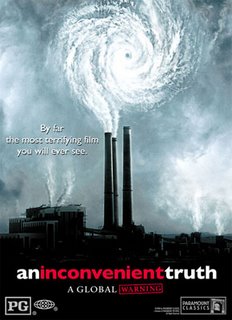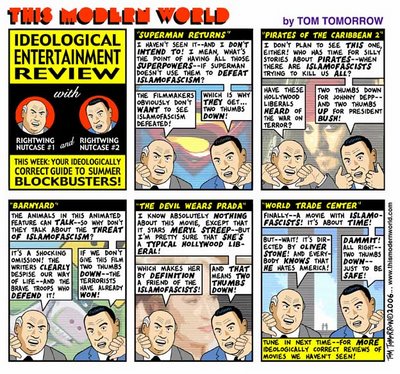 I'm a science teacher, a concerned citizen, and an admited democrat (though I went so far as to support Nader a couple of elections ago). It's be tough to find someone more targeted to see An Inconvenient Truth than I am.
I'm a science teacher, a concerned citizen, and an admited democrat (though I went so far as to support Nader a couple of elections ago). It's be tough to find someone more targeted to see An Inconvenient Truth than I am.Truth be told, the film left me feeling conflicted.
As someone with some power to spread messages - through my blog, through my classroom, through my circle of friends - I feel that I should promote the movie because of the message that it conveys. I do honestly believe that global warming is the issue that threatens our planet to an extent that no other issue ever has simply because it is so large and has been building for so long that any action that we hope to take to stem the rising levels of carbon dioxide in the atmosphere will have to be a massive effort, one with support from nations the world 'round.
I believe in the issue, the cause, and the campaign - all of whom are central to this film.
What leaves me conflicted are three things - I don't know that the film is nearly as good as most reviewers have written it to be; I really wish that the messanger had been someone other than Al Gore; and I wanted much more concrete detail and evidence than was presented in the film.
The lecture on which this movie is based, one given by Gore in a dozen nations and hundreds of cities, is an excellent one. The tone is lighthearted enough at times that the presentation doesn't seem pedantic but serious enough that the seriousness of the issue being discussed is able to get through. Graphics from numerous well-known sources - Futurama, Day After Tomorrow, CNN - are interspersed with masterfully presented graphs showing the relationships between rises in global temperature and atmospheric carbon dioxide levels. Hearing Gore deliver this presentation in person must be a gripping, moving experience.
The science is stunning and the likely consequences from our inaction so devestating that I would hope that anyone who sees this film will be moved into action, shaken out of a malaise and forced to make even small lifestyle changes to fight the good fight on any front possible.
I fear, however, that much of what is said is going to be said to people who already believe all of this and who are sympathetic to both Gore and his message. The film's presentation of the lecture finds Gore presenting in a lecture hall that feels like a movie set, the sort of "real-life" setting that shows up in any town-hall debate held between presidential candidates every four years. The set felt very artifical to me, and I think the presentation would have been more effective if filmed in front of a more typical lecture audience, one more akin to the university lecture halls that we see from time to time in the film as Gore speaks his way around the world.
Interspersed throughout the film, we get glimpses of Gore's background, helping us to understand why he has chosen this cause to champion. We visit the Gore family farm where he first learned about the glory of nature and of hard work. We see into his college days where he first heard about global warming. We hear of his sister who died of lung cancer, likely brought about from smoking - a tragedy that lead his father to abandon growing tobacco on the afore-mentioned farm. We also get a montage of hanging chads, court decisions, a consession speech, and a swearing in to remind us that our nation just might have been different had this man been leading us for eight years rather than the current office holder. We even get an opening joke from Gore reminding us that he "used to be the next president".
All of this, I feel, dilutes the message at the cost of selling the messenger. Many pundits have proposed Gore as a possible presidential candidate in 2008, his presence back in the ring a likely follow up to his media presence because of this film. I believe Gore when - in many of those interviews - he says that he has no intent to run again, but I do wish that nearly every film review didn't make mention somewhere along the way that more of Gore's personality appears here in the film than in the whole of the 2000 presidential campaign. After the nastiness and bitterness of that campaign, Gore has become nearly as polarizing a character as has President Bush. I fear that the message of this film, one that - as I have stated - may be the most important issue of our times - is being lost because of the messenger who is bringing it.
The flip side of that fear is that knowledge that no other public figure likely has the personal investment, the political clout, the statesman stature, and the practice to bring the message to the masses. I am thrilled that Al Gore has given this lecture and allowed/encouraged the lecture to be filmed, but I wish that it hadn't been Al Gore doing it all.
My final issue with the film is that I wanted more detail. I understand that within the scope of a one-hundred-minute film designed to be seen by non-science people it would certainly be difficult to present every piece of evidence, to reference every article that is mentioned as evidence, but that is what I want, and I fear that is what we need.
In my review of Good Night and Good Luck, I recounted that Edward R Murrow knew that he had to be note perfect, as clean and above reproach as possible because the stakes in that battle were simply too high to allow for even the possibility of loss. This film left me with that feeling - knowing that the stakes are too high to risk losing. Because of that, I hate to see websites and hear pundits (typically people without science training, I will admit) challenging Gore's statements and assertions and knowing that I simply don't have the facts at my disposal to argue Gore's side without reproach.
Because of this last, I have taken time to hunt down some websites that attempt to refute Gore's argument - focused primarily against the film - as well as some supporting his argument. I have begun to look through them and encourage you to do as well if you do care about the future of our planet.
- A movie reviewer defends himself and adresses many of the film's issues
- A blogger refutes Gore
- The film's website
- A site that purports to refute global warming
- The film's accompanying book - hopefully including more specific references and details
- A film reviewer who avoids the film and instead reviews Gore
- It's hard to find an unbiased website, but Wikipedia's might be the closest


No comments:
Post a Comment